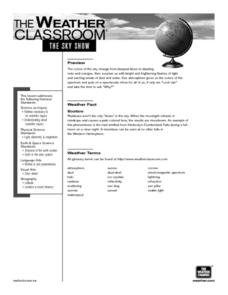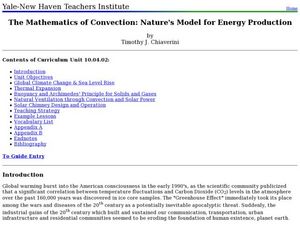Curated OER
Earth From Space
Students watch a series of programs from NASA titled "Earth From Space". After viewing the program, they identify ways NASA is researching the reasons why the Earth is changing. They discuss the various levels of the atmosphere and...
Curated OER
Weather in Your City
Learners observe weather conditions of a particular city. Multiple intelligences are explored within this lesson. They locate their particular city on a United States map. Each student writes about their discoveries in his/her journal...
Curated OER
Incoming Solar Radiation
Demonstrate how the spherical shape of the Earth contributes to unequal heating of its surface and results in varying climates at different latitudes. This would be an illuminating addition to your meteorology lessons, especially when...
Curated OER
Ocean Streams
The instructions for demonstrating ocean turnover are provided in this resource. You could set this up for your earth science class as part of a lecture on convection currents or as an explanation of how ocean currents form. An animation...
Curated OER
Albedo and Irradiation of Surfaces
Here is a physical science activity where pupils place thermometers inside of a white and a black paper pocket and place them under a lamp. They record and compare the temperature increase over a ten-minute period. Have your class...
Curated OER
Weather Wordsearch
In this science worksheet, students find the words that are associated with the measurement of weather changes. The answers are found at the bottom of the page.
Curated OER
Ozone Pollution: Smog Alert
Students examine factors the create smog. In this pollution lesson students complete an activity about ozone.
Curated OER
A Comparison of Cloud Coverage Over Africa
Students use a NASA satellite data to contrast amounts of cloud coverage over different climate regions in Africa. They explore how Earth's major air circulations affect global weather patterns, and relate to local weather patterns.
Baylor College
Using Heat from the Sun
Let's heat things up! This simple experiment demonstrates for students the important role the sun plays in providing the earth with energy. Place one cup of water in direct sunlight and one in shade, then take measurements in order to...
Baylor College
Rainbow in the Room
Uncover the science behind the beautiful phenomena of rainbows with a simple demonstration. Shine light through different-sized containers of water as young scientists learn that rainbows occur when visible light is split up into its...
Baylor College
Fossil Fuels and the Carbon Cycle
Humans are quickly depleting Earth's fossil fuels and locating them is becoming increasingly difficult! Layered muffins are used for models as young geologists take core samples in order to determine the presence of oil. Consider first...
Curated OER
Barometer and Boiling Points
Diagrams bring barometers to light in this PowerPoint. Several slides explain the structure and function of this apparatus. The relationship of air pressure to the processes of evaporation and boiling are also explained. This would be an...
McAuliffe-Shepard Discovery Center
Global Warming in a Jar
This well-organized lab activity introduces earth science pupils to the greenhouse effect. They will set up two experiments to monitor temperatures in an open jar, a closed jar, and a closed jar containing water. Ideally, you would have...
Curated OER
Sky Show
Middle schoolers participate in a discussion of the sky and colors. They watch a demonstration of how colors can change. They examine the issue of if weather should be a part of their coursework.
Curated OER
An Environmental Puzzle: The Carbon Cycle
Middle school science stars examine fuels and energy with a variety of activities. They begin with a KWL chart, read an informative passage, and then complete a puzzle. The puzzle itself is included. Cleverly, each piece corresponds to a...
Forest Foundation
Forests, Carbon & Our Climate
To conclude their examination of forest ecosystems, class members consider the role forests play in the carbon cycle and how forests can offset climate change.
Center Science Education
CO2: How Much Do You Spew?
Split your earth science or environmental studies class into groups and give each a scenario card. Scenario cards describe the lifestyles of 10 different fictitious families, focusing on their energy usage. Carbon dioxide emissions are...
NASA
Earth's Global Energy Budget
Introduce your earth science enthusiasts to the earth's energy budget. Teach them using an informative set of slides that include illuminating lecturer's notes, relevant vocabulary, embedded animations, colorful satellite maps, and a...
Consortium for Ocean Science Exploration and Engagement (COSEE)
Ocean Acidification: Whats and Hows
Open this lesson by demonstrating the production of acidic carbon dioxide gas by activated yeast. Emerging ecologists then experiment with seashells to discover the effect of ocean acidification on shelled marine organisms. They measure...
National Energy Education Development Project
Introduction to Wind Energy
The U.S. produced enough wind energy in 2015 to power all of the homes in Alaska, California, Delaware, the District of Columbia, Hawaii, Idaho, Maine, Montana, Nebraska, New Hampshire, North Dakota, Rhode Island, South Dakota, and...
Chicago Botanic Garden
Micro-GEEBITT Climate Activity
A truly hands-on and inquiry based learning activity bridges all the lessons in the series together. Beginning with a discussion on average global temperatures, young meteorologists use real-world data to analyze climate trends in order...
Curated OER
A Clasroom Study of the Life of an Airplane
Learners participate in an experiment to discover the properties of lift. They work together to complete calculations and collect data. They share their results with the class.
Curated OER
Breaking it Down
High schoolers will identify the factors that contribute to erosion and weathering. They will start by differentiating between chemical and mechanical weathering. They then apply what they learned by playing the online jeopardy game. Key...
Curated OER
The Mathematics of Convection: Nature's Model for Energy Production
High schoolers conduct a series of experiments to investigate density, buoyancy and climate. In this math lesson, pupils design and build a hot air balloon to demonstrate convection. They research and write a paper about solar chimneys.
Other popular searches
- Layers of the Atmosphere
- Atmosphere Layers
- Layers of Atmosphere
- Atmosphere Climate Weather
- Earth's Atmosphere
- Earths Atmosphere
- Layers of Earth's Atmosphere
- The Atmosphere
- Acid Rain and Atmosphere
- Earth Atmosphere
- Atmosphere and Climate
- Atmosphere Gases

























